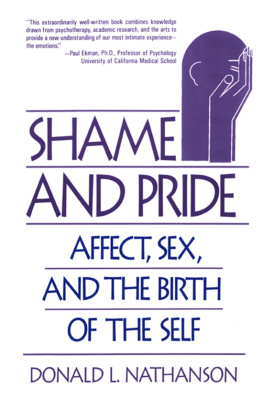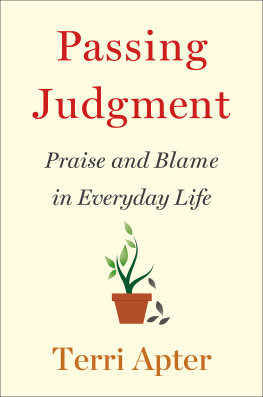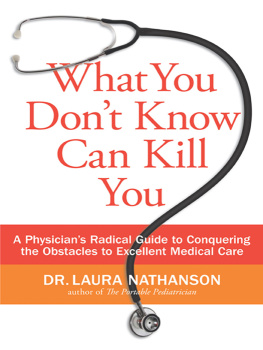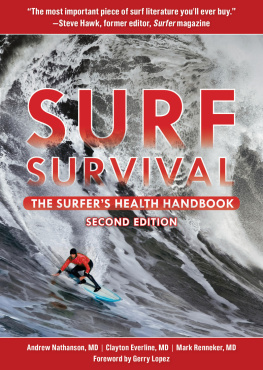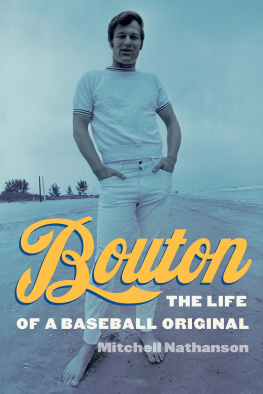SHAME AND PRIDE
A F F E C T , S E X , A N D
T H E B I R T H O F T H E S E L F

Donald L. Nathanson
W. W. Norton & Company New York London
To Silvan S. Tomkins
One spring day, not so many years ago, I ventured forth from the safety and sanctuary of my office and my study to share with some colleagues my growing conviction that we were all pretty much ignorant about the nature of shame. I said that we might help our patients better if we remedied this situation. A lifetime of painful shyness had made it difficult for me to speak in public, even though I had by that time spent more than 20 years studying the biology and the phenomenology of emotion. This was my first professional presentation in psychiatry.
I knew that shame was considered the ignored emotion, the Cinderella of the unpleasant emotions, according to Rycrofts Critical Dictionary of Psychoanalysis. It didnt seem possible to me that any one paper would change this, so I had organized an entire symposium on shame to take place under the umbrella of the American Psychiatric Association. Co-sponsored by the American Psychoanalytic Association, it turned out to be the first meeting in the history of psychiatry or psychoanalysis, either here in America or over in Europe where psychoanalysis got its start, to focus on the nature of shame.
Afterwards, a friend took me aside and said, That was really nice. But dont do anything more on shame. You wouldnt want to get a reputation for that. A kind and thoughtful man, he was truly concerned about my public image. Better to hide new ideas in obscurity than risk exposure and humiliation, especially ideas about an unpopular subject.
It was in that moment that I learned that the very idea of shame is embarrassing to most people.
So much discomfort does shame produce that people will go to great lengths to avoid it. Many of us who have studied shame in depth believe that it is a primary force in social and political evolution. Shameour reaction to it and our avoidance of itbecomes the emotion of politics and conformity. It guides and creates fashion; its influence in human civilization is paramount.
In the opening scene of George Bernard Shaws Man and Superman, John Tanner tells us that we live in an atmosphere of shame. We are ashamed of everything that is real about us; ashamed of ourselves, of our relatives, of our incomes, of our accents, of our opinions, of our experience, just as we are ashamed of our naked skins. For one interested in shame the problem is not that it is difficult to find examples worth study. Rather, the more significant puzzle is how it has managed to elude us until now. This most common of unpleasant experiences is also the least discussed.
Who among us has not at some time been paralyzed by shame? As a boy, poring over the Readers Digest anecdotes called My Most Embarrassing Moment, I wondered whether I could ever tell anybody about those moments when I had goofed, or made a fool of myself, or said precisely the wrong thing to someone I wanted to impress. Since we all tend to place ourselves in the position of the person telling a story, were I to tell you any of them right now I am afraid you might shudder with discomfort and stop reading. I have never mastered the clowns art of turning my own misfortune into comedy.
Perhaps laughter is the best defense against the pain of shame. The clown makes a trade. Dressed in his traditional costume (the classical clown is always male), he behaves with all the foolishness of a small child pretending to be an adult. Although people are laughing at him (which is embarrassing) the laughter is under his own control, which makes him feel powerful and proud of himself rather than helpless and ashamed.
Most of us work hard to present ourselves to the world as competent and cool. Any time people laugh at us our self-esteem is reduced and we are embarrassed. Any moment of embarrassment is guaranteed to interrupt the flow of our day and reduce our ability to live comfortably among others, let alone feel comfortable within ourselves. The clown gives up this very important piece of self-esteem in order to gain whatever sense of personal pride comes from his success in getting us to laugh at his command.
Most clowns, and certainly all comedians, are quick to admit that they are basically shy people, terribly afraid of being laughed at. One comic told me privately, The only time in my life I really feel comfortable with myself is when Im on stage working and the audience is laughing. Going out socially is a trap because Im too shy to talk to people as myself, and if I start to tell jokes or do my routine Im working and not going out to relax like ordinary people. So I tend to stay home a lot.
The circus clown strikes a good deal. It is only his garish costume and heavy makeup that identify him as the object of our laughter. Dressed in civilian clothes, he merges quietly, imperceptibly, into the crowd, his power and his frailties held privately within him. Throughout this book we will see everywhere how we adults balance our private selves and our public presentation, and how intricately these are tied up with what for each of us becomes our personal definitions of shame and pride.
The easiest way to start the study of shame is to observe the fine points of this linkage between embarrassment and laughter. All the equipment you need is in your own living room. Make a videotape of your favorite situation comedy and, after youve enjoyed it once or twice, watch it again to see why you laughed. Pick, if possible, a show without a fake audience, one that does not resort to a phony laugh track to force us into synchrony or conformity by telling us when to laugh. The conventional wisdom of the television industry dictates that a successful show must have a certain number of laughs per minute, whether or not something funny is happening. What we are after here are the moments in which you laugh.
Notice how often what you found amusing involved somebodys embarrassment. Examples may range from pratfalls or clear, obvious flashes of unexpected stupidity to subtle comments or allusions that made you think of something stupid you yourself had once done but that you didnt know anyone else had ever experienced.
Next, try to figure out why there was embarrassment associated with the action within the show. Pretty soon you will see that shame seems always to involve a more-or-less sudden decrease in self-esteem, a moment in which we are revealed as somewhat less than we want to believe. On a sitcom most people are friendly to each other, so whoever has been exposed is in an atmosphere of interpersonal safety. When our frailties or foibles are exposed before those in whose presence we do not feel safe or loved, this mild, humorous embarrassment gives way to the deeper forms of shame like humiliation or mortification. Comedy, however, rarely does more than hint at the darker side of shame; perhaps some of its success lies in the delicacy with which it plays around the edges of what is hidden within each of us. We all live on some line between shame and pride. The work of comedy is to make this border a bit safer.
The comedian stands alongside us, pointing at others, exposing the falseness of their self-esteem and so allowing us the safety of laughing at them, while the clown focuses our attention on himself and asks us to laugh at him. The only remaining performers who make us laugh are the jesters, who (to the extent they are given permission) can expose our secrets and make us laugh at ourselves. They live at the greatest risk, for the slightest slip will move them past the boundary of good taste into a realm where they incur only wrath. In the medieval court the jester alone could tell the truth about the king. Usually a deformed and therefore already defective and shameworthy creature, his humor came from this ability to expose and embarrass within strictly defined limits. There are a lot of jokes about jesters sentenced to death for going too far.
Next page
